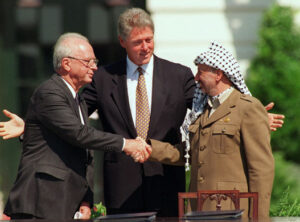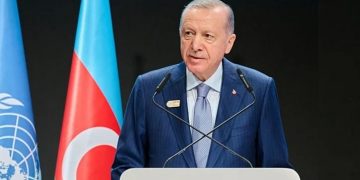 On Sept. 13, 1993, Shimon Peres and Mahmoud Abbas met on the South Lawn of the White House to sign the Israel-PLO Declaration of Principles, or the Oslo Accords. Palestine Libration Organization (PLO) leader Yasser Arafat and Israeli Prime Minister Yitzhak Rabin then sealed the agreement with a historic handshake.
On Sept. 13, 1993, Shimon Peres and Mahmoud Abbas met on the South Lawn of the White House to sign the Israel-PLO Declaration of Principles, or the Oslo Accords. Palestine Libration Organization (PLO) leader Yasser Arafat and Israeli Prime Minister Yitzhak Rabin then sealed the agreement with a historic handshake.
But the goals laid out in the Oslo Accords remain unfulfilled. In fact, the agreement is unlikely to survive 89-year-old Peres and 77-year-old Abbas, who are now presidents of Israel and the Palestinian Authority, respectively. Several factors contributed to the deterioration of prospects for lasting peace.
Perhaps the most important factor has been the continuation — and, at times, acceleration — of Israeli settlement activities in occupied Palestinian territories. Some Palestinians in the West Bank and Gaza objected to the Accords’ failure to call explicitly for the end of illegal Israeli settlement building. But, given the PLO’s weakness and lack of support in the Arab world after its refusal to oppose Iraq’s occupation of Kuwait, its leaders accepted the flawed agreement, arguing that Palestinian borders would be agreed upon during the transition period.
But, 19 years later, the Washington-based Foundation for Middle East Peace reports that more Jewish settlements have been built in the occupied Palestinian territories since the Oslo Accords than before they were signed. As a result, the need for Israel to freeze settlement activities has become an international — not just a Palestinian — requirement for effective peace talks.
Another crucial factor is continued violence. Since Rabin and Arafat shook hands, roughly 7,500 Palestinians and 1,400 Israelis have been killed, and many more have been injured or jailed. Israel’s unilateral policy of demolishing homes in Palestine has resulted in scores of Palestinians being deported or made homeless in Jerusalem, Hebron, the Jordan Valley and elsewhere. While killings have declined sharply in recent years, hardly a day passes without some form of violence, often against civilians — including children.
Fueling this violence is growing hopelessness in the absence of a diplomatic agreement. While international leaders fill the airwaves with talk of peace, they have failed to address the conflict boldly and resolutely.
For example, US President Barack Obama’s election four years ago revived hope that negotiations would resume. But Obama’s peace envoy, George Mitchell, resigned, and the quartet (the UN, the European Union, Russia and the United States) was sidelined. Meanwhile, Israeli Prime Minister Benjamin Netanyahu’s conditional promise to support Palestinian statehood has been rendered meaningless by his government’s provocative settlement policies in the areas that were supposed to comprise the Palestinian state.
The Oslo Accords divided the occupied territories into three regions. Palestinians took charge of the most densely populated urban areas, while Israel maintained total military and administrative control over the largest territory, “Area C,” which makes up 61 percent of the West Bank.
Many Palestinians believe that this serves a long-term Zionist aim to keep the land without the people. Indeed, Israeli settlements have amounted to de facto Israeli annexation of territory into which Palestinians seek to expand their state. As a result, without a clear agreement on borders, Area C will witness the most serious confrontations.
The Oslo Accords have also failed to put Palestinians on a path toward economic independence. According to the World Bank and other international agencies, slow and complicated bureaucratic and security processes, including hundreds of checkpoints, make Palestinian economic development impossible.
Palestinian dependence on Israeli goods exacerbates the problem, as does Israeli control over the movement of goods and people to, within and between the West Bank and the blockaded Gaza strip.
The 1994 Paris Protocol, one of the most important annexes to the Oslo Accords, was intended to define economic relations between Israel and the Palestinian Authority. But it has been hijacked by Israel for the benefit of its businesses. The protocol requires the Palestinian Authority to peg prices of certain goods and its rate of value-added tax to Israel’s; forces Palestinians to use Israel’s currency; and regulates customs procedures at border crossings with Jordan and Egypt.
The Palestinian-Israeli conflict, now at least 45 years old, is not a complicated problem; on the contrary, it can be summed up quite succinctly: To paraphrase the American political operative James Carville, “It’s the occupation, stupid.”
Eventually, Abbas will gain the UN General Assembly’s acceptance of Palestinian statehood — his final accomplishment before leaving politics, as he has confided to his top aides. After his departure, Israel will miss his firm opposition to violence and his support for security cooperation.
The symbolic decision on statehood, followed by Abbas’s exit, will mark the end of the process that began in Oslo, and that has been undermining Palestinian aspirations for nearly two decades. With the Oslo Process now clearly dead, two options remain: chaos, extremism and violence, or a new peace process — ideally one that can end the occupation and allow for Palestinian independence and freedom alongside a safe and secure Israel.
*Daoud Kuttab, a former professor of journalism at Princeton University, is general manager of the Community Media Network in Amman. © Project Syndicate 2012













